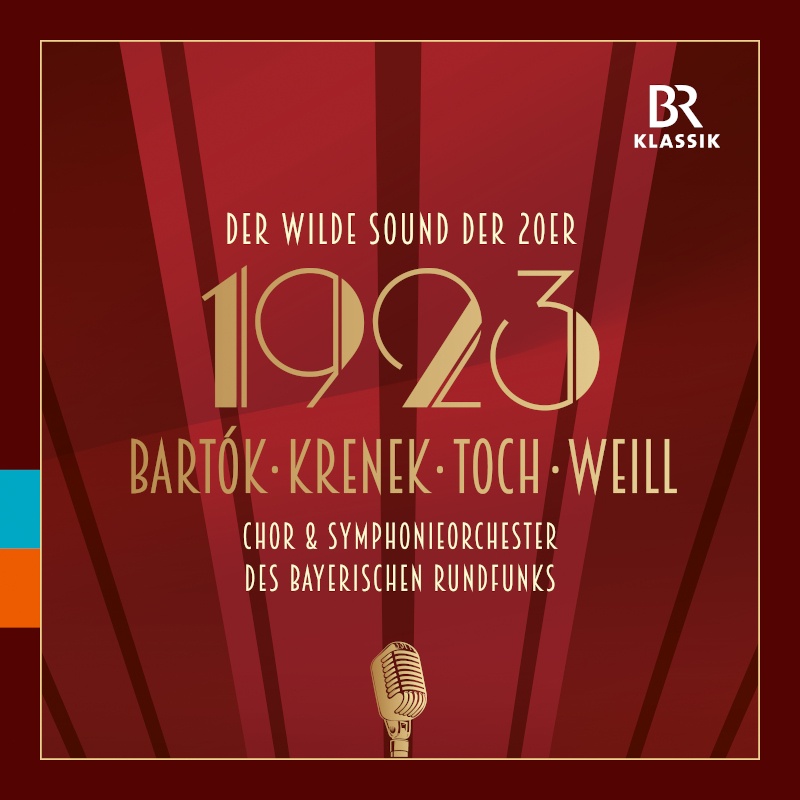
1923: Bartók · Krenek · Toch · Weill

This new CD, released by BR-KLASSIK as part of the program focus on “100 Years of Broadcasting”, offers recent studio recordings from April 2021 (Toch, Weill) and March 2022 (Krenek) as well as a live recording in the Munich Philharmonie im Gasteig from March 2017 (Bartók) with the Chor and Symphonieorchester des Bayerischen Rundfunks.
Order online nowOctober 29, 1923 – a date steeped in history. In the midst of a year of political and economic crisis, the age of public radio in Germany was ushered in with the first broadcast of the “Berliner Funkstunde”, from the attic of an office building on Potsdamer Platz. – Radio offered entirely new possibilities for the production and reception of music. The composers assembled on this CD not only profited from these developments, but also, in part, actively shaped them. Kurt Weill was a critical chronicler of the rapid rise of radio as a mass medium; he reflected on its musical use in countless articles, and composed some radio music at the end of the 1920s. As early as 1924, Ernst Krenek was commissioned to write a “radio blues” and made radio a part of the dramatic action in his successful “jazz opera” “Jonny spielt auf” (1927). And in 1929 Ernst Toch, who was extremely interested in the technological and media developments of the time, also composed radio music tailored to the specific possibilities of the medium with his “Bunte Suite”.
The composer Ernst Toch from Vienna experienced the crisis year of 1923 in Mannheim, where his “Dance Suite” for flute, clarinet, violin, viola, double bass and percussion op. 30 was premiered on November 19 with great success. In this work, commissioned for the expressive dancer Frieda Ursula Back who choreographed its premiere, Toch was able to realise his interest in cross-disciplinary collaboration and new forms of expression. His virtuoso and imaginative use of instruments is one of the most fascinating aspects of the suite.
The “Frauentanz” for soprano, flute, viola, clarinet, horn and bassoon op. 10 by Kurt Weill, written in the summer of 1923, reflects the interest in chamber music line-ups that was typical of the time. The decisive factor was not only a new ideal of sound and expression, but also the experience that in times of crisis, pieces with small ensembles had better chances of being performed. Weill’s song cycle quickly gained recognition. After its successful Berlin premiere in February 1924, it was published a few months later as the young composer’s first work in print and was his most frequently performed piece until 1927.
The enormously productive Ernst Krenek had found essential impulses for his work in Berlin; when the crisis came to a head in the summer of 1923, he returned to Austria, where in October he composed the “Three Mixed Choirs” a cappella op. 22 on poems by Matthias Claudius. Krenek designed these folksong-like works written by a lyricist from the age of Sensibility as parables, critically reflecting and commenting on contemporary experiences and developments.
For the festive concert celebrating the 50th anniversary of the unification of the cities of Buda and Pest to form the capital and residence city of Budapest in the autumn of 1923, Béla Bartók created his “Dance Suite” for orchestra – a “rather touchy issue”, as the internationalist-minded composer explained in a private note. His music ingeniously thwarted the cultural-political intentions of his “ultra-Christian-nationalist” patrons. – After chamber music works, a large orchestral work concludes the programme of this CD.
Anna-Maria Palii soprano
Natalie Schwaabe flute
Bettina Faiss clarinet
Jesús Villa Ordónez bassoon
Ursula Kepser horn
Korbinian Altenberger violin
Benedict Hames viola
Lukas Richter double bass
Guido Marggrander percussion
Chor des Bayerischen Rundfunks
Symphonieorchester des Bayerischen Rundfunks
Cristian Măcelaru conductor
BR-KLASSIK CD 900206
Total Time: 68:04 Minuten
- New music from 1923, the year in which public radio in Germany was born:
Ernst Toch: Dance Suite for flute, clarinet, violin, viola, double bass and percussion, op. 30
Kurt Weill: Frauentanz – Seven Poems of the Middle Ages for soprano, flute, viola, clarinet, horn and bassoon, op. 10
Ernst Krenek: Three mixed choirs a cappella, op. 22
Béla Bartók: Dance Suite for Orchestra, Sz 77 - Studio recordings from 2021 (Toch, Weill) and 2022 (Krenek); live recording in 2017 from the Munich Philharmonie im Gasteig (Bartók)
- First-rate cast of performers; Howard Arman conducts the Bavarian Radio Chorus, and Cristian Măcelaru the Bavarian Radio Symphony Orchestra
- CD is part of the programme focus on the topic “100 Years of Broadcasting”